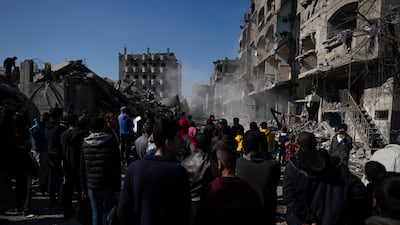Live updates: Follow the latest on Israel-Gaza
A senior UN official urged Israeli authorities on Thursday to grant greater humanitarian access to northern Gaza, stressing that current limitations are obstructing the distribution of vital resources.
“Keeping Gaza on a drip feed not only deprives a desperate population of life-saving support, it drives even greater chaos that further impedes humanitarian delivery,” special co-ordinator for the Middle East Peace Process Tor Wennesland told the Security Council.
He also called on Israel to address “key impediments” to UN humanitarian efforts on the ground, as more than two million people are facing extreme food insecurity.
“We need more safety measures, greater security and the tools and access points to scale up aid, particularly in the north,” he said.
Mr Wennesland expressed deep concern over a possible full-scale Israeli military operation in the densely populated Rafah area, where about 1.4 million Palestinians are sheltering.
Rafah is also the only entry point for UN humanitarian aid for Gaza.
According to local health authorities, the Israeli military bombardment of Gaza has killed more than 29,400 Palestinians. It has also displaced about 85 per cent of the enclave’s 2.3 million residents and laid waste to large portions of the strip.
Eight killed in Israeli strike on Rafah – video
Israel has said it will allow civilians to leave before attacking but it is not clear where they would go, with much of the rest of the tiny enclave consumed in combat.
During his recent visit to the Gaza Strip, Mr Wennesland reviewed “operational and security challenges” concerning the entry and distribution of humanitarian aid, and the "near total breakdown in law and order".
“Eighty-four per cent of health and education facilities are damaged or destroyed. Over 62 per cent of all roads and electricity feeder lines are unusable,” he stated.
Michael Lockyear, secretary general of the international medical humanitarian organisation Doctors Without Borders, described the humanitarian response in Gaza as an "illusion".
"A convenient illusion that perpetuates a narrative that this war is being waged in line with international laws," he said.
"Calls for humanitarian assistance have echoed across this chamber. Yet in Gaza we have less and less every day, less space, less medicine, less food, less water, less safety."
On Friday, UN Secretary General Antonio Guterres described the situation in Gaza as an “appalling indictment of the deadlock in global relations” and that the humanitarian operation there is “on life support”.
Mr Guterres added that Rafah is at the core of aid operations in Gaza and that a full offensive on the city would be “devastating” for the hundreds of thousands of civilians there who are already on the edge of survival”.
Aftermath of Israeli attacks on Rafah – in pictures
Mr Lockyear urged the Security Council to demand an immediate and sustained ceasefire in Gaza.
“Meeting after meeting, resolution after resolution, this body has failed to effectively address this conflict,” he said.
“We have watched members of this council deliberate and delay while civilians die. This death, destruction, and forced displacement are the result of military and political choices that blatantly disregard civilian lives.
“These choices could have been – and still can be – made very differently,” he said. “This is not just political inaction—it has become political complicity.”
The Security Council voted on Tuesday on a draft resolution written by Algeria demanding an immediate humanitarian ceasefire.
The proposed text was not adopted due to a veto from the US. Apart from the UK, which abstained, all other council members voted in favour of the text.
China's ambassador to the UN, Zhang Jun, noted that "at this point, the council needs to demonstrate a strong resolve rather than wield negotiating skills only."














